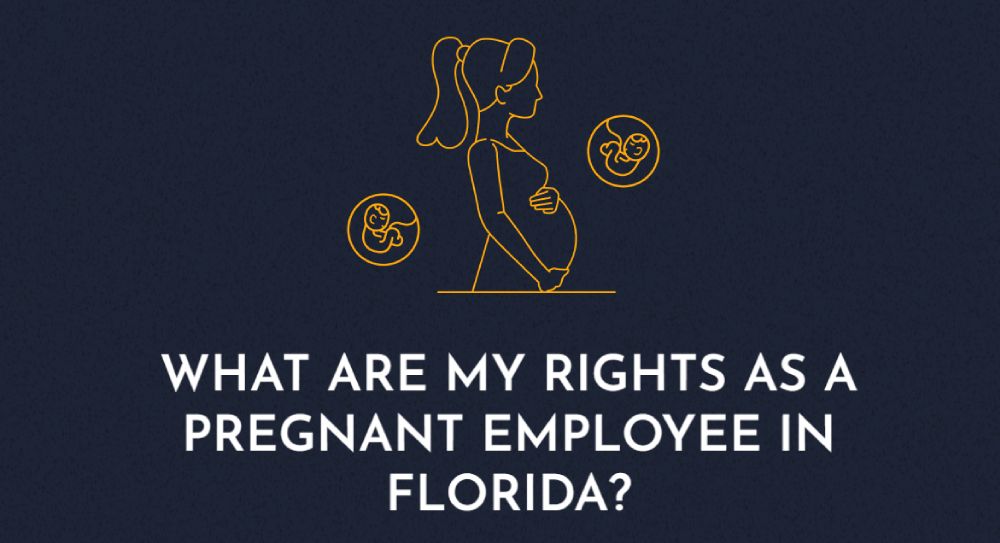
Pregnancy shouldn’t put your job at risk, but unfortunately, many employers still make working while pregnant more difficult than it has to be. Whether it’s subtle pressure to cut hours, odd comments about your future availability, or flat-out denial of reasonable accommodations, pregnancy discrimination shows up in ways that aren’t always obvious.
You’ve got legal rights that don’t vanish just because you’re expecting. A Florida employment lawyer will help you understand how federal and state laws apply to your workplace situation and make sure you’re protected before, during, and after childbirth
You Can’t Be Treated Differently Just Because You’re Pregnant

Florida employers with at least 15 employees must follow federal laws that prohibit discrimination based on pregnancy, childbirth, or related medical conditions. Your manager can’t cut your hours, remove you from projects, or hold back opportunities simply because you’re pregnant.
What’s important to understand is that the discrimination doesn’t need to be overt. It can show up as “concern” about your health or assumptions about whether you’ll return to work. If an employer claims to act in your best interest but winds up limiting your responsibilities, that’s still unlawful. Your Florida employment attorney will evaluate the facts behind those decisions and help you push back.
Pregnancy Is Protected Under Multiple Federal Laws
Your rights don’t come from just one law. They’re layered under several statutes that intersect. Title VII of the Civil Rights Act, as amended by the Pregnancy Discrimination Act, explicitly includes pregnancy-related conditions under sex discrimination. That’s foundational. But other protections matter, too.
If you’re temporarily unable to perform your job due to pregnancy, your employer must treat you the same way they’d treat someone with a short-term disability. You might qualify for light duty or modified tasks. You don’t need to “power through” or prove loyalty by working in pain. A Florida employment lawyer will make sure your employer doesn’t pick and choose which accommodations they offer based on bias.
You Might Be Entitled to Job-Protected Leave
The FMLA (Family and Medical Leave Act) mandates that eligible employees can take as many as three months (12 weeks) of leave for pregnancy and childbirth-related needs. The employer isn’t required to pay you during that time, but you can’t lose your job. That includes prenatal care, bed rest, recovery, and caring for your newborn. However, the FMLA only applies if you’ve worked for your employer for at least 12 months and the company has 50 or more employees within a 75-mile radius.
If your employer qualifies and you meet the criteria, you have a right to that leave, whether your boss likes it or not. Turn to an experienced attorney who can help you document the necessary paperwork and stand firm if your employer tries to sidestep compliance.
You Can Ask for Reasonable Accommodations Without Fear of Retaliation
Some pregnancies are smooth. Others come with complications. Whether it’s morning sickness that makes standing for long periods difficult or a high-risk condition requiring frequent breaks, you shouldn’t lose your job because your body changes.
Florida’s state laws reinforce what federal protections already cover. If your job responsibilities create unnecessary risk, you have the right to request modifications, like sitting instead of standing, limiting heavy lifting, or temporarily shifting certain tasks. Your employer doesn’t get to fire you for asking. What are the dangers of ignoring those rights? You could face unnecessary health complications or job loss that could’ve been prevented. If your manager tries to intimidate or retaliate when you speak up about what you need, your Florida employment lawyer can step in.
You’re Still Protected After Giving Birth
Some employers think protection ends after delivery, but that’s not how the law works. Postpartum complications, pumping schedules, and the need for medical appointments don’t strip you of your job security. Under the Fair Labor Standards Act, employers must provide break time and a private space, other than a bathroom, for nursing employees to express milk.
This is where many companies get it wrong. They’ll offer a conference room but forget to provide a lock. Or they’ll claim “undue hardship” when asked for more than one break. A skilled Florida employment attorney will make it clear that federal law doesn’t give your employer a pass just because they find accommodations inconvenient.
Don’t Ignore the Subtle Forms of Discrimination
You might not be demoted. You might still have a paycheck. But if you notice your input being ignored, meetings happening without you, or sudden “performance issues” arising that were never mentioned before pregnancy, those are red flags.
Discrimination often shows up under a polite disguise. A supervisor may say they’re “just trying to help” by keeping you off travel schedules or excluding you from demanding projects. However, if those decisions affect your trajectory at work, that’s discrimination. A Florida employment lawyer will help you build a record of these micro-behaviors and connect them to broader patterns that reveal unfair treatment.
You Don’t Need to Be Physically at Work to Be Discriminated Against
Remote work isn’t a shield. Some employers assume pregnant employees working from home won’t push back against unfair treatment. They’ll reduce assignments, delay responses, or quietly replace your role while you’re out on leave. These tactics are often masked as “restructuring.”
Even in a hybrid or fully remote setting, the same rules apply. You can’t be sidelined or penalized based on pregnancy or birth-related circumstances. When you hire a Florida employment attorney, they’ll investigate email communications, Zoom exclusions, and digital activity logs to uncover how discrimination plays out behind the scenes.
Retaliation Isn’t Always Loud – But It’s Still Illegal
Let’s say you’ve asserted your rights. You’ve asked for modified duties or questioned a suspicious demotion. If the next step your employer takes is to assign you less visible work, skip you in a promotion cycle, or give negative reviews that lack documentation, you’re likely facing retaliation.
Retaliation doesn’t need to come with a firing notice. It’s any adverse action that occurs because you exercised a legal right. Can I still sue if I wasn’t fired? Yes. Even subtle retaliation is grounds for legal action. Your Florida employment lawyer will compare pre- and post-complaint treatment, evaluate timelines, and show how retaliation can look like passive punishment rather than overt hostility.
Pregnancy Harassment Violates the Law – Even If It’s Subtle
It’s not always about policy. Sometimes, it’s about comments. “How long are you going to keep working?” “Shouldn’t you be taking it easy?” “You’re not as fast as you used to be.” These aren’t harmless questions – they’re harassment if they create a hostile work environment.
You’re allowed to speak up when workplace culture shifts against you because of pregnancy. You shouldn’t have to “tough it out” or laugh along with inappropriate remarks. Your attorney will hold your employer accountable for fostering a workplace where pregnancy is treated like a liability instead of a normal life event.
You Have Protection Whether You’re Married, Single, or Anything Else
Your family structure doesn’t affect your rights. You don’t need to be married to be taken seriously, and you don’t need to match some idealized picture of a “working mom.” Whether you’re single, partnered, divorced, or anything in between, your rights are the same under the law.
Some employers assume things about your situation and let those assumptions drive decisions. If your manager thinks you’ll need “too much help” or believes your personal life makes you less reliable, that’s discrimination. A Florida employment lawyer will dismantle those assumptions and focus on what matters – your job performance and your legal protections.
Timing Matters – But Delay Doesn’t Mean You’ve Lost Your Rights
There’s a window for filing complaints or lawsuits. That window depends on which laws apply. Generally, you have 180 days to file a charge with the Equal Employment Opportunity Commission (EEOC), but some situations give you more time under state law. Even if you’re not sure whether your timeline has passed, it’s worth finding out.
You don’t need to have all the answers before speaking up. Your Florida employment attorney will walk you through the deadlines that apply to your case and make sure nothing falls through the cracks because of confusion about timing.
You’re Not Asking for Special Treatment – You’re Asking for Equal Footing
Sometimes, employers frame your requests as “special favors.” However, you’re not asking for more than anyone else. You’re asking for what the law already requires. That might be temporary modifications, protected leave, or just a workplace where pregnancy isn’t treated like a liability.
A Florida employment lawyer will remind your employer that accommodating pregnancy is part of compliance, not generosity. You’re entitled to be treated like any other employee with a medical condition or physical need, and the law doesn’t leave room for double standards.
Job Descriptions Aren’t an Excuse to Avoid Fair Treatment
Some companies try to hide behind the fine print. “Essential functions” of a job are often used as a reason to deny accommodations. But job descriptions don’t always match reality. If your role doesn’t regularly involve physical lifting or constant standing, your employer can’t suddenly use those duties to justify discrimination.
Your attorney can compare the official description to your day-to-day tasks and show how pregnancy-related restrictions don’t interfere with performance. Can you collect unemployment if your employer forces you out over these restrictions? In some cases, yes. Employers don’t get to manipulate expectations to sideline you.
You Can File a Complaint Without Quitting

You don’t need to give up your job to assert your rights. Filing a complaint with HR, the EEOC, or the Florida Commission on Human Relations doesn’t mean you’ve committed to leaving. You have every right to report what’s wrong while continuing to work.
If you’re worried about how the process will affect your job, your Florida employment lawyer will help you prepare. From documenting conversations to gathering communications, your case can be built while you remain employed. You don’t need to choose between legal action and a paycheck.
If You’re Denied a Promotion While Pregnant, That Could Be Discrimination
Pregnancy doesn’t put your ambition on hold, and it certainly doesn’t put your achievements up for debate. If you’ve consistently performed at a high level, taken on additional responsibilities, and met or exceeded expectations, you’ve earned serious consideration for a promotion, pregnant or not.
When that upward path suddenly stalls after you disclose your pregnancy, it’s not just disappointing. It could be illegal. Employers often fall back on vague terms like “organizational fit” or claim it’s not the right moment for advancement. But when those explanations follow closely behind your pregnancy announcement, they start to look suspicious.
Closely Examining if You Were Unfairly Passed Over
You don’t have to accept abstract reasoning that masks discriminatory intent. A legal professional will scrutinize the timeline of your performance reviews, the metrics used to evaluate candidates, and the language used to justify the promotion decision. If others with similar or weaker qualifications advanced while you were sidelined, that pattern matters.
A skilled lawyer will compare your career progression with peers, check whether leadership previously encouraged you to apply for a higher-paying position and highlight discrepancies in how standards were applied. If pregnancy was the only change in your situation and suddenly you’re no longer “right for the role,” that’s not a coincidence – it’s a signal that your employer viewed your condition as a liability. Knowing how to protect yourself early, by documenting conversations and keeping records of performance reviews, can help expose that bias if it turns into a legal claim.
Your Health Insurance Should Cover Maternity Needs
If your employer offers health insurance, it must include pregnancy-related care under the Affordable Care Act. That means prenatal visits, delivery, and postnatal care must be included in covered services. You can’t be charged higher premiums, excluded from certain plans, or forced to pay additional fees because you’re expecting.
If your employer’s insurance provider treats pregnancy differently or imposes hidden fees, that’s a red flag. Your Florida employment attorney will address insurance discrimination and make sure your coverage follows federal law.
Don’t Hesitate to Contact a Florida Employment Lawyer if You Believe Your Company Violated Your Rights
You don’t have to accept unfair treatment just because you’re pregnant. Your rights are woven through federal and state laws that recognize the importance of balancing work and family without penalty.
If your employer crosses the line – or even comes close – it’s worth talking to a Florida employment lawyer to protect your future. You’ve got every reason to expect fair treatment and zero reason to let it slide when that expectation isn’t met. A lawyer is waiting to provide you with a free case evaluation.

